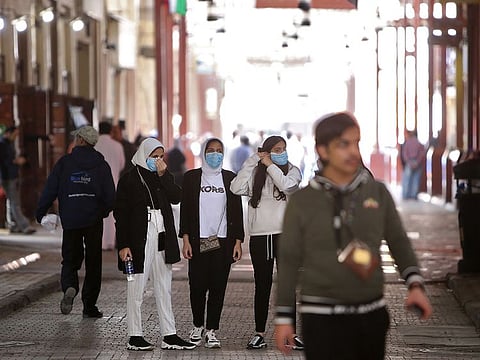Kuwaiti women call for change in citizenship laws
Kuwait doesn’t grant citizenship to children of Kuwaiti women married to non-Kuwaitis

Also In This Package
Kuwait City: An online petition has gained more than 17,000 signatures, calling on the National Assembly and the cabinet of ministers to grant citizenship to children of Kuwaiti women married to non-Kuwaitis.
The issue resurfaced due to many factors, ranging from the demographic imbalance to the benefits citizens received during the pandemic.
“For a lot of women who have families stuck abroad, this issue has become even more serious after the COVID-19 crisis,” Al Anood Al Sharekh, director of Ibtkar Strategic Consultancy, told Gulf News.
Many families of Kuwaiti women are still stuck outside Kuwait as they are not able to return owing to the closure of airports.
“It is important to highlight that there are many children of Kuwaiti women who are working and volunteering on the frontlines during the pandemic,” Gray Area, a social initiative focused on empowering children of Kuwaiti mothers, as well as raising awareness about the legal, social and cultural barriers they face, told Gulf News.
Kuwait is one of the 25 countries that does not permit women to pass on their nationality to their children or spouses.
“I think this issue exists because of a patriarchal idea that bloodline belongs to men,” Dr Ebtehal Al Khateeb, a Kuwaiti academic and activist, told Gulf News.
As of 2016, there are 19,000 Kuwaiti women married to non-Kuwaiti men and with approximately 56,000 children, according to the Public Authority for Civil Information.
“Their lives are precarious especially as they get older because then you have to think of them as any other expat. You have to apply for a work permit or a way for them to stay in Kuwait and if you die [the wife] before them you have to figure out a way for how to keep their inheritance,” explained Al Sharekh.
Children of Kuwaiti women married to non-Kuwaiti men face challenges from applying for a scholarship to obtaining a job. The government covers their education up to university level, plus their health care.
“Many of the legal rights of children of Kuwaiti women are dependent on their mothers. Thus, children of Kuwaiti mothers are never seen as fully independent,” Gray Area explained. “Children of Kuwaiti women are treated like their fully Kuwaiti counterparts until the age of 21, but after that, their legal and social statuses are uncertain and unstable.”
“This creates a mental and psychological strain on children and their families,” explained Al Khateeb.
On the other hand, non-Kuwaiti women who are married to Kuwaiti men could qualify for citizenship after being married for five years, according to the Ministry of Interior.
“Just like we nationalise the wife of a Kuwaiti man, for the sake of the family, the husband and children of a Kuwaiti woman should be nationalised as well,” said Al Khateeb.
Since 2018, Gray Area has been creating various videos, highlighting stories and initiating campaigns across social media to raise awareness on this issue and deliver it in a format that reaches as many people as possible.
“The campaign name was inspired by the fact that children of Kuwaiti women are neither categorised as Kuwaitis nor expats, thereby existing in a sort of grey area, both socially and legally,” Gray Area said.
‘Aware of the sufferings’
Other than Gray Area, there have been calls from various other civil societies, from Kuwait Women Without Borders to Kuwait’s Women’s Cultural and Social Society, to grant citizenship to children of Kuwaiti women married to non-Kuwaiti men.
“The youth are more aware of the sufferings that this group faces and there has been more dialogue recently around the issue,” Al Sharekh clarified.
Upcoming parliamentary elections
“Given the upcoming elections, we are going to hear candidates speak about various issues concerning women, including nationalising the children of Kuwaiti women,” explained Al Sharekh, “although campaign promises don’t always translate into concrete actions in parliament.”
Parliamentary elections are scheduled for November.
“After the petition, the buzz will have parliamentary candidates talking about this topic during their campaigns. Are they going to take it seriously? I do not have much hope,” said Al Khateeb.
Stateless people
There are approximately 500,000 stateless people, otherwise known as Bidoon, in Kuwait. Kuwait is one of seven countries that have nationality laws that create a greater risk of stateless people.
“Many people try to separate the discussions regarding stateless nationals and children of Kuwaiti mothers, but these issues intersect. For example, there are many children of Kuwaiti mothers who are stateless for it is not uncommon for Kuwaiti women to marry stateless nationals for various reasons, including familial ties. With the current citizenship laws, however, there is little to no pathway to obtaining citizenship,” explained Gray Area.
“There is an intersection between the children of Kuwaiti women married to non-Kuwaiti men and the Bidoon issue, both of which is regarding citizenship,” explained Al Khateeb.
Sign up for the Daily Briefing
Get the latest news and updates straight to your inbox









